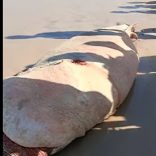Mozambique: Nights will be warmer this winter - INAM
Mozambique: Recruitment of 4,000 new police agents begins on Monday – Watch

Screen grab: Ministério do Interior-MINT
The Ministry of the Interior wants to recruit 4,000 new officers for the Police of the Republic of Mozambique (PRM).
The recruitment and selection tests will take place at PRM provincial commands throughout the country, starting on Monday August 18, until September 30. The recruitment notice was officially released on Tuesday (August 12).
Selected candidates will attend the 44th Basic Police Officer Training Course, lasting nine months, to be conducted at the Matalana Police Training School in Maputo province. Training is scheduled to begin in January, 2026.
The suspension of recruitment was decided in 2023 by then-Commander General Bernardino Rafael, who justified the measure as a way to concentrate resources on building and rehabilitating infrastructure, acquiring vehicles, and modernizing services. At the time, Rafael also promised to review the police curriculum before resumption.
The PRM General Command warns that it is vigilant in preventing corruption in the selection process.
Yesterday, the spokesperson for the PRM General Command, Leonel Muchina, assured that the positions are not for sale and that anyone involved in acts of corruption or fraud will be held accountable.
“The PRM General Command distances itself from all acts contrary to the law,” Muchina said.
However, Nazário Muanambane, the president of the Mozambican Police Association, warns of the existence of corruption schemes within the police force. He alleges that some officers in charge of recruitment processes have facilitated illicit payments to secure positions, allowing the entry of individuals with bad intentions and deviant behaviour, undermining the institution’s credibility.
Nazário Muanambane advocates strengthening ongoing training as a solution to improve police performance. He believes it is necessary to reform the Police Sciences Academy and ensure a training path that ranges from basic training to specialization, including curricula and disciplines capable of responding to complex criminal phenomena.
He also considers it essential to prepare police officers for specific roles in order to improve investigative effectiveness.
In turn, retired Lieutenant Commander Abdul Machava told ‘O País’ that the current focus on increasing the number of officers has not been effective in combating crime, and
advocates investing in technology that allows for significant results with sufficient personnel, avoiding reliance on large numbers.
The retired lieutenant commander also warns of the risk of the country moving toward what he calls a “democratic dictatorship”, in which the police become an instrument for restricting individual freedoms.












Leave a Reply
Be the First to Comment!
You must be logged in to post a comment.
You must be logged in to post a comment.